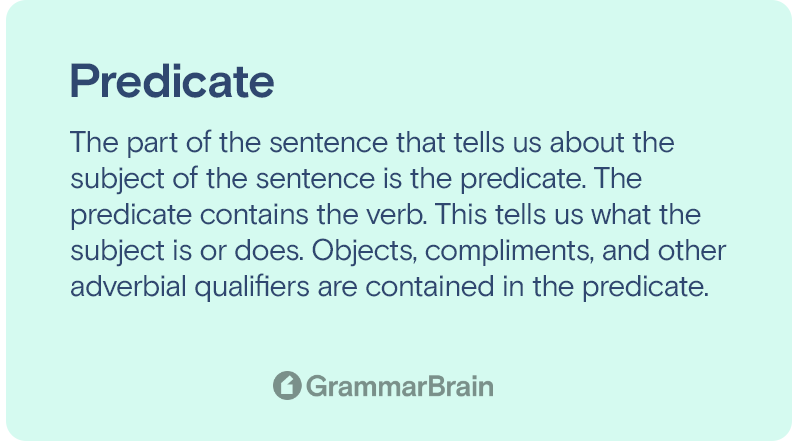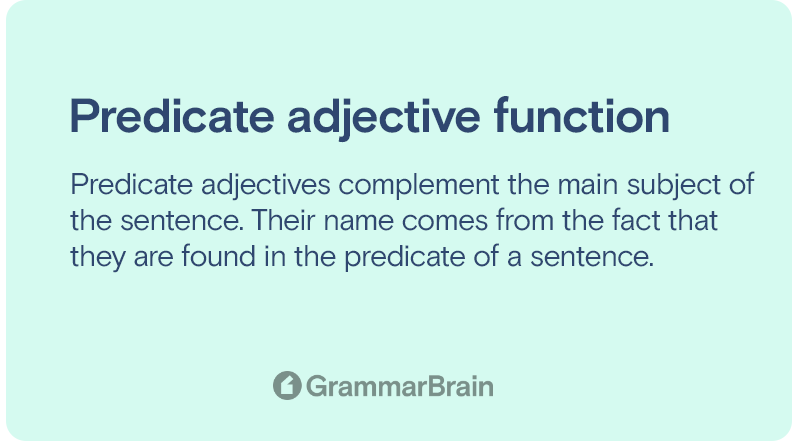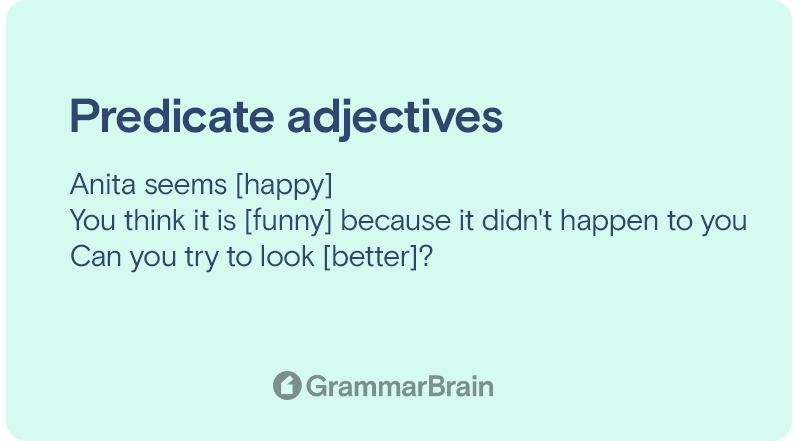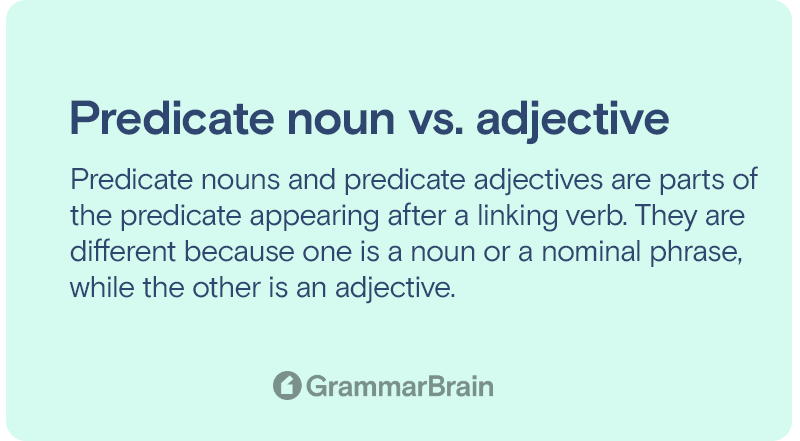What is a predicate adjective? Most sentences have a basic structure that consists of two parts. It is made up of a subject as well as a predicate. The main topic of the sentence is the subject. Typically, a noun or a pronoun makes up the subject. The second part of the sentence tells us what the subject is doing. This part is the predicate.
For example, in the sentence “Ria ate bread,” Ria is the subject, and ate bread is the predicate.
The predicate part of a sentence contains predicate adjectives that are different from regular adjectives. Let’s see what they are!

What are predicate adjectives?
Predicate adjectives alter or characterize a statement’s subject and are attached to it by a linking verb. For example, take the sentence, “The pizza was good“. Here, the predicate adjective is good, and it describes and connects to the subject Pizza through the linking verb, was. You can tell which word is the predicate adjective once you find the linking verb.
| Form | Definition |
| Predicate Adjective | Predicate adjectives are adjectives that modify or describe the subject of a sentence or clause and are linked to the subject by a linking verb. |
What are compound predicate adjectives?
If the main subject is modified by more than a predicate adjective, it forms a compound predicate adjective. As the name suggests, it consists of more than a single word. For example:
- The girl was cute and bubbly
- She was so powerful, unrelenting, and strong.
In both sentences, more than a single word describes the main subject. These are compound predicate adjectives.
How do nouns and predicate adjectives work together?
A predicate adjective, like a regular adjective, describes a noun. Predicate adjectives come after a noun, followed by a linking verb. The predictive adjective tells us more about the main subject or noun.

Predicate adjectives vs. attributive adjectives
An adjective is a word that describes the subject. They usually give us more information about the main subject. For example, in the phrase “lovely flower,” lovely is the adjective.
These adjectives are called attributive adjectives. They tend to appear before nouns or pronouns. This is different from predictive adjectives, which appear after a noun and a linking verb.
How do predicate adjectives work?
Predicate adjectives complement the main subject of the sentence. Their name comes from the fact that they are found in the predicate of a sentence.
A verb that comes before a predicate adjective becomes a linking verb.
How to identify predicate adjectives
Identifying predicate adjectives is easy once you know which words are the linking verbs. Linking verbs are regular verbs like:
They can describe the sense or status of the subject.

Examples of predicate adjectives in sentences
To understand predicate adjectives a bit more, look at these sentences:
- Anita seems happy
- You think it is funny because it didn’t happen to you
- Can you try to look better?
- The story was hilarious
Each of the predicate adjectives comes after a linking verb.
Predicate adjectives vs. predicate nominatives
Linking verbs are not always followed by a predicate adjective. Sometimes, they have a noun or a noun phrase after them. In this case, nouns following the linking verb are predicate nominatives.
For example:
- Bruno is good – Predicate adjective
- Bruno is a dog – Predicate nominative
Both predicate adjectives and predicate nominatives give us more information about the subject. They are both subject complements.
Using Participles as predicate adjectives
Predicate adjectives need not always be an adjective. They can be participles as well. Participles are verbs that act like adjectives and give more information about the subject. Both past participles and present participles can act like predicate adjectives.
For example:
- My sister is annoying
- The burger looks tempting
Why are predicate adjectives important?
Predicate adjectives are important as they can help avoid inevitable grammatical mistakes. Predicate adjectives should be used instead of adverbs after a noun and a linking verb.
For example:
- The burger tastes badly – This is wrong
- The burger tastes bad.
The first sentence is wrong as an adverb comes after the linking verb. Since adverbs are used to alter verbs, people might put them after linking verbs as well.
However, this is wrong, as only a predicate adjective or a predicate nominative should follow a linking verb.
The second reason predicate adjectives are important is that while using a foreign language, they help in using the proper case. Adjectives in English remain the same in both predicative and attributive contexts.
For native English speakers, predicate adjectives rarely result in literary errors. The case of subject complements, however, differs in several other languages, such as Russian.
Predicate adjectives are important while using such languages where the subject complements shift case.
Predicate adjective word list
Some common examples of predicate adjective words are:
- different
- done
- impossible
- lovely
- beautiful
Conclusion
Understanding predicate adjectives and how to use them can help you write better. This article gives a comprehensive guide on what predicate adjectives are and their examples as well.
Understanding differences between predicate adjective forms

Predicate Noun vs. Predicate Adjective
Predicate nouns and predicate adjectives are parts of the predicate appearing after a linking verb. They are different because one is a noun or a nominal phrase, while the other is an adjective.
Predicate Adjective vs. Attributive Adjective
A predicate adjective only appears in the predicate after a linking verb qualifying only the subject. An attributive adjective can appear in the subject or the predicate, qualifying either the subject or the object.
FAQs
1. Is a predicate the same as an adjective?
An adjective reflects a noun’s nature. A predicate, in contrast, is a phrase that provides information about the subject.
2. What are the different types of adjectives?
The different types of adjectives are possessive adjectives, interrogative adjectives, demonstrative adjectives, and compound adjectives.
3. What are predicate adjectives in ASL?
Like in regular grammar, the words or symbols used in the predicate adjective describe an action carried out by the subject or state information about the subject.
4. How do you define predicate adjective?
The definition of predicate adjective is an adjective that modifies the subject but comes after a linking verb and is not followed by a noun
5. What’s the difference between a noun phrase, linking verb and predicate adjective?
If what comes after a linking verb is an adjective or an adjective phrase. Then it would be considered a ia predicate adjective, and if it’s a noun, or a noun phrase, or a noun clause , it’s a predicate nominative
6. What is a compound predicate adjective?
A compound predicate adjective is a combination of two or more adjectives or adjective phrases.
7. How do predicates and clauses work together?
Clauses contain at least one subject and predicate but this isn’t necessarily a complete sentence.
8. What are compound predicates?
Compound predicates are two words joined by the conjunction “and.”
Inside this article
Fact checked:
Content is rigorously reviewed by a team of qualified and experienced fact checkers. Fact checkers review articles for factual accuracy, relevance, and timeliness. Learn more.
Core lessons
Glossary
- Abstract Noun
- Accusative Case
- Anecdote
- Antonym
- Active Sentence
- Adverb
- Adjective
- Allegory
- Alliteration
- Adjective Clause
- Adjective Phrase
- Ampersand
- Anastrophe
- Adverbial Clause
- Appositive Phrase
- Clause
- Compound Adjective
- Complex Sentence
- Compound Words
- Compound Predicate
- Common Noun
- Comparative Adjective
- Comparative and Superlative
- Compound Noun
- Compound Subject
- Compound Sentence
- Copular Verb
- Collective Noun
- Colloquialism
- Conciseness
- Consonance
- Conditional
- Concrete Noun
- Conjunction
- Conjugation
- Conditional Sentence
- Comma Splice
- Correlative Conjunction
- Coordinating Conjunction
- Coordinate Adjective
- Cumulative Adjective
- Dative Case
- Determiner
- Declarative Sentence
- Declarative Statement
- Direct Object Pronoun
- Direct Object
- Diction
- Diphthong
- Dangling Modifier
- Demonstrative Pronoun
- Demonstrative Adjective
- Direct Characterization
- Definite Article
- Doublespeak
- False Dilemma Fallacy
- Future Perfect Progressive
- Future Simple
- Future Perfect Continuous
- Future Perfect
- First Conditional
- Irregular Adjective
- Irregular Verb
- Imperative Sentence
- Indefinite Article
- Intransitive Verb
- Introductory Phrase
- Indefinite Pronoun
- Indirect Characterization
- Interrogative Sentence
- Intensive Pronoun
- Inanimate Object
- Indefinite Tense
- Infinitive Phrase
- Interjection
- Intensifier
- Infinitive
- Indicative Mood
- Participle
- Parallelism
- Prepositional Phrase
- Past Simple Tense
- Past Continuous Tense
- Past Perfect Tense
- Past Progressive Tense
- Present Simple Tense
- Present Perfect Tense
- Personal Pronoun
- Personification
- Persuasive Writing
- Parallel Structure
- Phrasal Verb
- Predicate Adjective
- Predicate Nominative
- Phonetic Language
- Plural Noun
- Punctuation
- Punctuation Marks
- Preposition
- Preposition of Place
- Parts of Speech
- Possessive Adjective
- Possessive Determiner
- Possessive Case
- Possessive Noun
- Proper Adjective
- Proper Noun
- Present Participle
- Prefix
- Predicate



